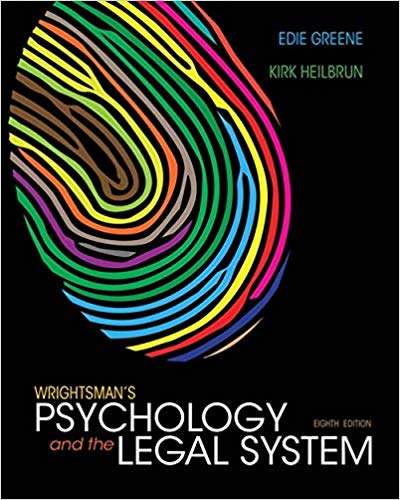In Stock
Wrightsman’s Psychology and the Legal System 8th Edition by Edith Greene – Test Bank
Digital item No Waiting Time Instant DownloadISBN: 1133956564 ISBN-13: 9781133956563Edition: 12th EditionPublisher : Cengage LearningAuthor Name: Edie Greene, Kirk Heilbrun
Original price was: $55.00.$24.00Current price is: $24.00.
Wrightsman’s Psychology and the Legal System 8th Edition by Edith Greene – Test Bank
Chapter 1
Psychology and the Law: Choices and Roles
Questions for Class Discussion and/or Essay Examinations
1. As noted in Chapter 1, laws need to be developed and modified to keep up with the rapid changes in our lives and in society. Laws must also always take into consideration both individual rights and public safety. Discuss Edward Rosenheimer’s case and the court process and decision that followed. What are some recent developments in technology and society, which are in need of regulation and/or have resulted in the development of new laws? (The Importance of Laws)
2. How does the psychological approach to the study of the law differ from the sociological approach? (The Psychological Study of Law)
3. Explain Kurt Lewin’s position on behavior. In your explanation, use an example that pertains to the legal system. (The Psychological Study of Law)
4. Provide examples of the types of tasks that a forensic psychologist might do. (The Psychological Study of Law)
5. Chapter 1 presents four basic choices in the psychological study of the law. What are these four basic choices? Describe the dilemma that each choice presents. (Basic Choices in the Psychological Study of the Law)
6. What does it mean to say that the rights of the individual and the rights of the common good are in conflict? Give an example. (Basic Choices in the Psychological Study of the Law)
7. Contrast the crime control model and the due process model. (Basic Choices in the Psychological Study of the Law)
8. Discuss the maxim: “it is better that ten guilty persons shall go free than that one innocent
person should suffer” in relation to the due process model of the criminal justice system. (Basic Choices in the Psychological Study of the Law)
9. Describe what the principle of equality means within the legal system. How does profiling violate that principle? (Basic Choices in the Psychological Study of the Law)
10. Discuss and provide different examples of the ways the principle of equality may be
violated (e.g., discrepant treatment under the law based on financial or social status, race
or ethnicity, gender, age, etc.). (Basic Choices in the Psychological Study of the Law)
11. Define profiling. Describe the evidence presented in Chapter 1 that suggests that profiling occurs. (Basic Choices in the Psychological Study of the Law)
12. What is the principle of proportionality? (Basic Choices in the Psychological Study of the Law)
13. Why is discretion in the application of the law important? What are some problems that can emerge when discretion is used? (Basic Choices in the Psychological Study of the Law)
14. How do different players in the legal system (i.e., police officers, prosecutors, juries and judges) exercise discretion? (Basic Choices in the Psychological Study of the Law)
15. Describe the case of Troy Davis. Define clemency, and indicate how this concept is relevant to Davis. (Basic Choices in the Psychological Study of the Law)

Reviews
There are no reviews yet.